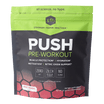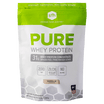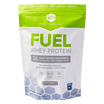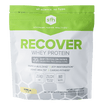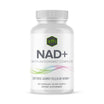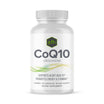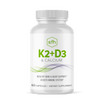The Truth about Seed Oils

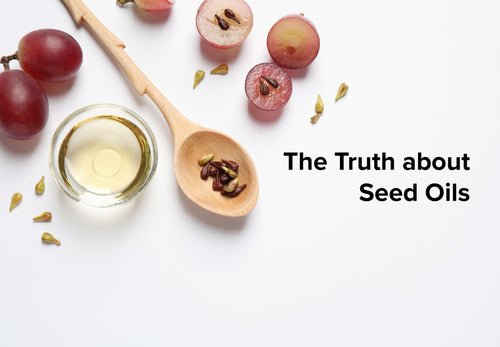
Are Seed Oils Really That Bad For You?
The Real Deal Behind The Hype...
There has been a major push against seed oils happening on the internet over the past couple of years. Fitness and nutrition influencers have called them inflammatory and toxic, and many even insist that seed oils have no place in a healthy diet.
But are seed oils actually as bad for you as your social media feed wants you to believe? It’s a broad subject that’s subject to plenty of debate, but the actual scientific research seems to suggest that the “dangers” of seed oils are often taken largely out of context.
Let’s talk about what the current body of evidence has to say about seed oils, including their potential for inflammation and toxicity.

What are Seed Oils?
Seed oils are extracted from various seeds and used for cooking and food production. Some of the most common seed oils you might encounter include:
- Peanut Oil
- Canola Oil
- Soybean Oil
- Corn Oil
- Grapeseed Oil
- Sunflower Oil
What's Inflammation?
Inflammation is your body’s natural defense against injury and sickness. When your immune system senses a potential danger (think: an invading bacteria or a cut) it launches an inflammatory reaction to protect you. Your blood rushes to the scene, releasing chemicals that attack and neutralize the threat.
So contrary to popular belief, some inflammation is a good thing!
However, if your body thinks it is constantly under attack, that inflammatory reaction can run rampant. This kind of inflammation — called chronic inflammation — can cause your immune system to attack its own cells, and is ultimately linked to a wide array of serious long-term health concerns.

So what does inflammation have to do with seed oils?
Seed oils have a specific kind of fatty acid in them called omega-6s, and it’s these fats that are responsible for their bad reputation. Some omega-6s turn into compounds that promote inflammation. So it’s no surprise that many people believe that eating foods that contain these fatty acids (like seed oils) will automatically increase inflammation in your body.
However, here’s the kicker: many studies have actually found that eating more omega-6s alone does not increase inflammation in healthy adults. In fact, studies by the American Heart Association have even found that omega-6s can reduce inflammation and promote heart health!
So what’s the deal here? It might have to do with another kind of fatty acid you may be familiar with: omega-3s.
Omega-3s are healthy fatty acids that are thought to have anti-inflammatory properties. As it turns out, the ratio of omega-6s to omega-3s in your diet might play a bigger role in inflammation than eating omega-6s alone. Studies have suggested that diets that have a higher ratio of omega-6s to omega-3s can encourage inflammation while eating more omega-3s can help mitigate that unwanted immune reaction.
Context is everything. Yes, seed oils contain omega-6 fatty acids, and omega-6s do have pro-inflammatory properties. However, this doesn’t mean that consuming seed oils on their own is a cause of inflammation without taking the rest of your diet into account.

Seed oils and toxicity
Another big reason there’s so much pushback against seed oils is because of how they are used in today’s food production, an industry that is notorious for overprocessing.
Remember, the ratio of omega-6s to omega-3s is a huge contributing factor to how your body reacts to it. On average, Americans are eating far more omega-6s than omega-3s — and the prevalence of these super-processed foods plays a big part in that. Read any Nutrition Facts label for your favorite chips, baked goods, or prepackaged snacks and you’ll likely find seed oils like corn, canola, or soybean oil listed among the ingredients.
Highly processed foods are notoriously bad for your health, but omega-6s on their own aren’t solely to blame: they also tend to contain other compounds like trans fats, saturated fats, and simple sugars.
Seed oils have a lower oxidation point than other oils, and this can produce damaging free radicals when cooked to high temperatures. Free radicals are compounds that damage your cells and are linked to a variety of serious health concerns including inflammation.
Not all seed oils are made equal!
While there are pros and cons with all seed oils depending on how they’re used, it’s also well worth noting that not all seed oils have the same level of risk.
Take flaxseed oil, for example. Even though the big fear around seed oils is that they may promote inflammation, flaxseed is known for being a great source of omega-3s, those anti-inflammatory fatty acids that your body needs to balance out omega-6s.
Sunflower oil is another great option when compared to other seed oils. It’s thought to help improve cholesterol levels, and it is less likely to be genetically modified than other seed oils. Meanwhile, studies on other common seed oils like soybean oil have found that their consumption is more commonly associated with poor metabolic health. Soy is also a common allergen and that's one of many reasons that all SFH products are Soy free.
As a result, sunflower oil is a great choice when compared to other fats when necessary. For example, SFH uses sunflower lecithin, rather than soy lecithin, as an emulsifier to keep supplements fluffy and not clumpy.
The bottom line:
When you hear someone on the internet completely vilifying an entire food group, it’s important to think about the context of your entire diet.
While seed oils may contain fatty acids that can have inflammatory properties, they usually aren’t the sole dietary factors contributing to inflammation and/or poor health.
It doesn’t hurt to minimize your intake of seed oils, especially since so many of us are eating too many of them compared to omega-3s, but a little here and there is not going to cause serious damage if you’re eating an otherwise balanced diet. If you're particularly concerned about this, an easy solution is to supplement your diet with high quality Omega-3 oil to ensure your body is getting a sufficient amount and healthy balance of Omega-3s.


